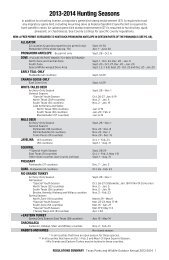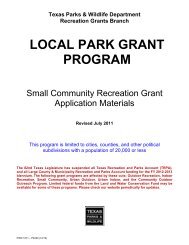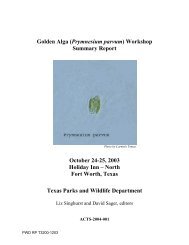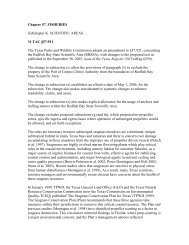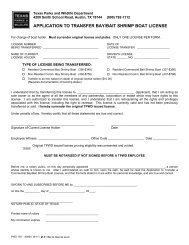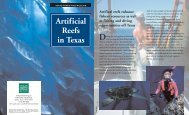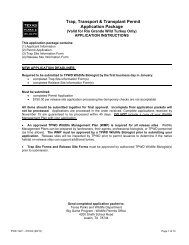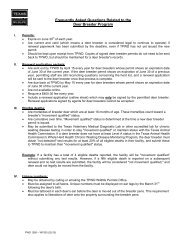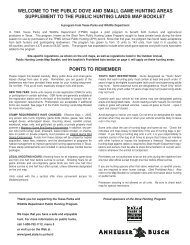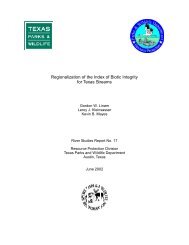1-1 Appendix 1 Responses to survey questions administered to ...
1-1 Appendix 1 Responses to survey questions administered to ...
1-1 Appendix 1 Responses to survey questions administered to ...
Create successful ePaper yourself
Turn your PDF publications into a flip-book with our unique Google optimized e-Paper software.
<strong>Appendix</strong> 2 <strong>Responses</strong> <strong>to</strong> open-ended <strong>questions</strong> <strong>administered</strong> <strong>to</strong> TPWD fisheries<br />
staff.<br />
COASTAL ADMINISTRATION-- QUESTION 1.<br />
RESPONSES: 8<br />
What is the greatest strength/impediment in the agency’s ability <strong>to</strong> apply scientific<br />
information <strong>to</strong> resource management?<br />
• Strength – a long-term, consistent database <strong>to</strong> work with.<br />
• The fishery independent and fishery dependent sampling programs are the<br />
greatest strength in the agency’s ability <strong>to</strong> apply scientific information <strong>to</strong> resource<br />
management. Without these programs, the quality and quantity of data would not<br />
be available. The programs are well designed, statistically sound, tested, and<br />
retested. They are court room tested. Their longevity, approaching 30 years, is a<br />
test they also have passed. Data is worth a 1000+ words. When the TPWD<br />
commission and executive office say we are science based, they do mostly rely on<br />
and trust the data from our management programs.<br />
• Scientific data generated from the coastal fisheries resource management<br />
sampling program is incorporated directly in<strong>to</strong> management decisions.<br />
Management decisions are largely based on the data generated.<br />
• Strength – long-term standardize data collection process and the resulting data<br />
base.<br />
• Strengths: High levels of professionalism and training in all levels of staff;<br />
Scientific basis for resource and harvest sampling programs that has produced<br />
ability <strong>to</strong> view long-term trends; Confidence of TPWD Commission and upper<br />
level management in the validity of data-based conclusions.<br />
• Impediment – The “turn-around time” of data from collection <strong>to</strong> master file<br />
(available for analysis) is <strong>to</strong>o long (can be 6 months or longer). This limits the<br />
ability <strong>to</strong> react <strong>to</strong> potential problems quickly.<br />
• The greatest impediment is the delay between the time data collection has<br />
occurred and the time the data are available for use by decision-makers.<br />
Currently we are working with an 8 month time delay, and we have recently had<br />
up <strong>to</strong> a 12 month delay<br />
• The impediments are minor compared <strong>to</strong> the strength of the overall programs. An<br />
impediment is the standardization and repetitiveness of the sampling program<br />
itself. Due <strong>to</strong> the nature of time consumption required by program staff in the<br />
collection of data, they do not have adequate time <strong>to</strong> review, study, analyze and<br />
really get <strong>to</strong> work with their data as they should.<br />
• Another impediment is that frequently upper level decisions by division direc<strong>to</strong>rs,<br />
executive office, or commissions over ride data with personal agendas, politics, or<br />
other pressures. Although these are often a good reality check, fear of controversy<br />
by commissioners negates or dilutes power of data based decisions.<br />
• Short response time lines, lack of data for non-game species/issues.<br />
2-1



